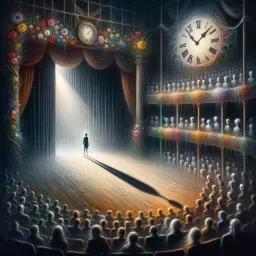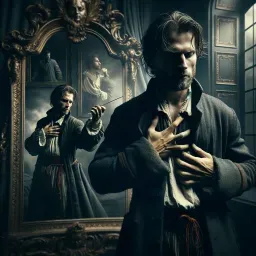”Give sorrow words; the grief that does not speak
knits up the o-er wrought heart and bids it break“

0
0
0
0
- Meaning
- This phrase emphasizes the emotional and psychological necessity of expressing grief. Shakespeare suggests that unspoken sorrow accumulates within the heart, becoming a heavy burden that eventually leads to a psychological or emotional breakdown. The metaphor of knitting a heart emphasizes the tightening, constricting effect of suppressed emotions.
- Allegory
- The person at the edge of the cliff symbolizes the precariousness and depth of human sorrow. The glowing orb represents the intense, yet unexpressed, grief held within. Speaking into the orb signifies the act of giving sorrow words, leading to the light that symbolizes the healing power of expressed grief. The contrast between the tumultuous sea and stormy sky, and the calm skies and illuminated path, represents the journey from inner turbulence to emotional clarity and relief, resonating with Shakespeare's message about the necessity of articulating grief for psychological well-being.
- Applicability
- The teaching of this phrase can be applied in various personal and social scenarios, such as supporting friends dealing with loss, encouraging open communication about emotional distress, and validating the importance of mental health. Acknowledging and speaking about grief can be crucial for emotional healing and preventing emotional crises.
- Impact
- The phrase is often cited in discussions about grief and mental health, highlighting the importance of expressing emotions. It has had a lasting impact on literature and psychology, resonating in contexts that emphasize emotional expression and mental wellness.
- Historical Context
- Shakespeare wrote "Macbeth" around 1606, during the Renaissance period in England. This era was marked by significant developments in literature, art, and human thought. The play's exploration of psychological depth is a testament to the Renaissance's focus on human emotions and experiences.
- Criticisms
- Some might argue that expressing grief may not be universally effective for healing and that different individuals may find solace in various ways, including private contemplation. The phrase could be critiqued for assuming a one-size-fits-all approach to dealing with sorrow.
- Variations
- Variations of this phrase could be found in different cultures with emphasis on the necessity of emotional expression. For instance, in many Asian cultures, the importance of emotional balance and articulation can be reflected in various sayings and proverbs. Understanding these cross-cultural interpretations can promote a more inclusive perspective on emotional health.
-

The empty vessel makes the loudest sound.
-

Words, words, mere words, no matter from the heart.
-

Speak of the devil.
-

They do not love that do not show their love.
-

I wasted time, and now doth time waste me.
-

How sharper than a serpent's tooth it is to have a thankless child!
-

The quality of mercy is not strain'd, it droppeth as the gentle rain from heaven upon the place beneath.
-

Life's but a walking shadow, a poor player that struts and frets his hour upon the stage and then is heard no more.
-

Love all, trust a few, do wrong to none.
-

O, what a rogue and peasant slave am I!
-

One touch of nature makes the whole world kin.
No Comments